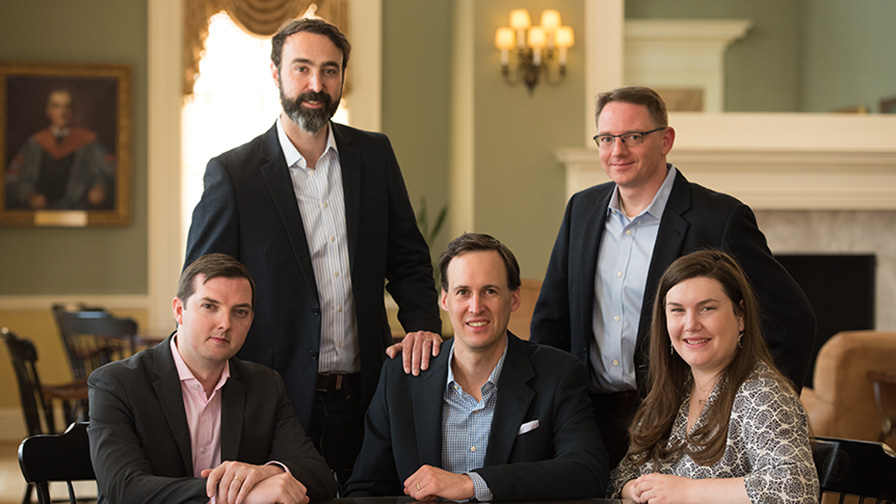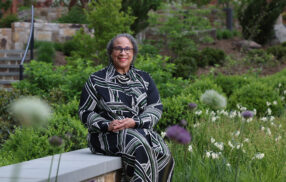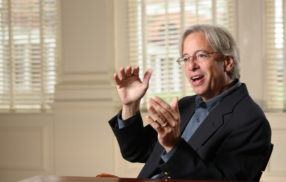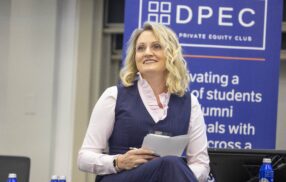
UVA Darden Executive MBAs Leave Legacy Through New Student Investment Fund
By Dave Hendrick
University of Virginia Darden School of Business students Phillip St. Ours (Class of 2016) and Brendan Miniter (Class of 2016) call the MBA for Executives (EMBA) experience a transformational one — a two-year program that has led to lifelong friendships, an expanded skill set and new professional opportunities.
As Miniter and St. Ours approach the transition to Darden alumni, they and many of their Class of 2016 colleagues are leaving their imprint on the Executive MBA, as well, establishing a first-of-its-kind Executive MBA Student Investment Fund (ESIF) that aims to be a permanent addition to EMBA’s offerings.
Although the fund will be a practical outlet for professionals interested in researching investment opportunities, managing assets and trading, there’s also an explicit attempt to more closely bind the students in the executive format to future EMBA classes and the Darden community as a whole.
“In your second year, you not only recognize the mark the MBA program is having on you, but also the drive to leave a mark on the program itself. A drive to build a legacy,” said St. Ours, a Charlottesville-based developer with a background in asset management. “Ten years from now, this will be a bridge to connect to the future cohort. That’s what the extracurricular experience is all about.”
The Darden Capital Management course is a well-known aspect of the residential MBA experience, allowing students to gain hands-on asset management experience among five funds with roughly $10 million in assets. However, there has never been an analogous option for the EMBA format, which was launched in 2006. The discrepancy is an understandable one, as EMBA students are only on Grounds intermittently and balance their Darden workload with full-time jobs and often families.
St. Ours said he found broad support and enthusiasm when pitching the idea to his EMBA colleagues, with a majority quickly expressing interest in the concept. Indeed, out of a class of 61, more than 40 EMBAs began to meet regularly over the course of First Year to discuss the potential new initiative.
Given the widespread interest, the EMBAs realized they likely needed to think beyond Darden Capital Management, which isn’t structured to accommodate a large number of executive students with much different schedules than their residential MBA counterparts. Setting out to explore options for an extracurricular program geared exclusively toward executive students, the EMBAs met encouragement from EMBA Associate Dean Ron Wilcox and Assistant Dean Barbara Millar, who supported the twin goals of enhancements to the program and greater connections between EMBA students and Darden.
Wilcox alerted the group to endowment funds from the EMBA Classes of 2008 and 2010 earmarked for innovation in the EMBA program and tasked the group with forming an independent study group to formulate the nuts and bolts of such an offering.
Although setting up the new program was clearly going to be a significant time commitment, Miniter said he and his classmates were reminded of Darden Dean Emeritus Bob Bruner’s imploring of the EMBAs to “say yes” to the new and unexpected opportunities that would be coming their way.
“The question of ‘do you have time to do this’ comes up a lot,” said Miniter, a former journalist and policy advisor at the George W. Bush Presidential Center. “Why are you going to Darden? You come here to do something different and make a change and do something that’s not normally done. You have to jump at opportunities like this that come along.”
A group of nine EMBAs took part in the independent study, doing the unglamorous work of devising policies and guidelines and soliciting support and feedback from faculty, administrators and alumni.
St. Ours stressed the work of a number of EMBA classmates that brought the fund from idea to fruition in such a short period of time. The inaugural leadership team includes St. Ours as CEO, Miniter as COO, Mac Livingston (Class of 2016) as chief investment officer, Generra Peck (Class of 2016) as chief communications officer and Andrew Zasowski (Class of 2016) as portfolio manager.
Eventually, the group settled on what seemed like three reasonable goals for the investment fund to achieve before the 2016 EMBAs graduated:
- Raise at least $1 in additional funding to grow the funds for investment.
- Make at least one trade.
- Develop a leadership team in the next class of EMBAs who could “take the baton.”
Any profits generated will remain in investments for now, and the ESIF team expects that members of a future cohort may devise policies and procedures around the use of returns.
“For this to survive, we have to manage that first transition,” said St. Ours, noting the complications of coordinating with a class with which they have almost no overlap. And yet, the groundwork for a smooth handoff appears to be in place, and St. Ours said roughly a dozen members of the EMBA Class of 2017 are interested in the program.
As they contemplated their first trade, the group of interested EMBAs recently engaged in their first stock pitch night, with a group of students offering a deep dive into an oil refining company. Such activities allow the fund members to both share potential expertise in their professional sphere — as well as skills developed or honed at Darden — while demystifying the mechanics of asset management.
Indeed, the fund’s backers believe the diversity of backgrounds among the EMBAs will make the fund a strong, nimble vehicle. Moreover, engagement with the fund could encourage future EMBAs to broaden their outlook regarding the sorts of professional opportunities available to them.
“The point in all of this isn’t necessarily to make this fund huge,” said Miniter. “There are two potential profits here: there’s the money, but the other is what you’re actually gaining from the experience. If you bring that kind of perspective to it, it brings a lot of clarity.”
With a foundation in place and the outlook for the fund secured as a credit-garnering elective for future EMBAS, the ESIF backers hope they are leaving a program that can be built on and enhanced by future Darden Executive MBA classes.
“We see this as an opportunity to continually improve and continually apply lessons learned,” said St. Ours. “We hope we can grow the asset base, but also every year grow the community.”
Although in its infancy, Wilcox said he had little doubt that the fund would be a long-term contributor to the EMBA program.
“I absolutely see this as something that’s going to continue,” Wilcox said, noting that his only concern will be finding enough course spots for all of the interested students. “It’s going to work because these guys did a lot of work.”
The University of Virginia Darden School of Business prepares responsible global leaders through unparalleled transformational learning experiences. Darden’s graduate degree programs (MBA, MSBA and Ph.D.) and Executive Education & Lifelong Learning programs offered by the Darden School Foundation set the stage for a lifetime of career advancement and impact. Darden’s top-ranked faculty, renowned for teaching excellence, inspires and shapes modern business leadership worldwide through research, thought leadership and business publishing. Darden has Grounds in Charlottesville, Virginia, and the Washington, D.C., area and a global community that includes 18,000 alumni in 90 countries. Darden was established in 1955 at the University of Virginia, a top public university founded by Thomas Jefferson in 1819 in Charlottesville, Virginia.
Press Contact
Molly Mitchell
Associate Director of Content Marketing and Social Media
Darden School of Business
University of Virginia
MitchellM@darden.virginia.edu




